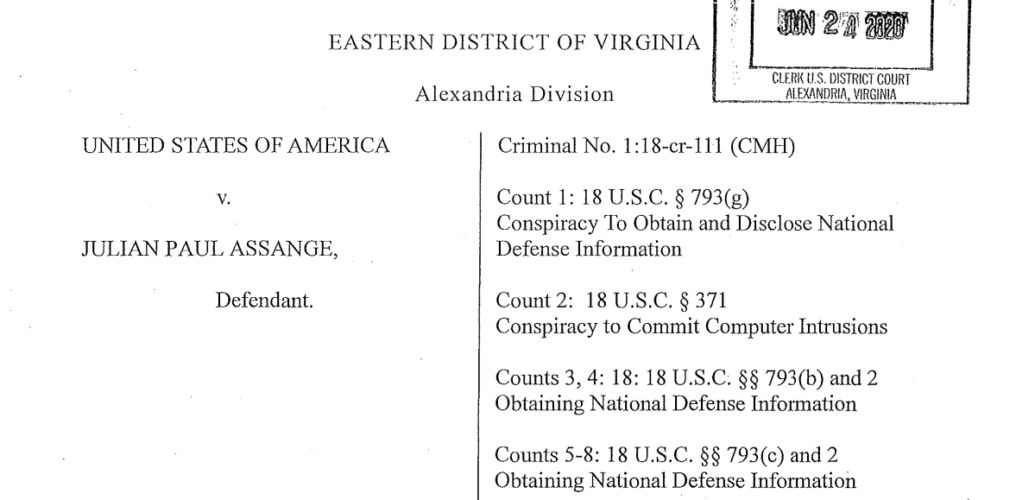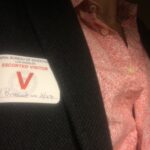The second superseding indictment of Julian Assange refers to many appearances and statements that he made, along with fellow WikiLeaks members Sarah Harrison and Jacob Appelbaum (referred to in the indictment as WLA-3 and WLA-4 respectively), in addition to chat logs. I had previously leaked several of the logs from the government’s sealed file and broke the story in a 2018 article that outlined several elements that were later included in the indictments. To give the references in the indictment context, and let everyone speak in their own unedited voice, I’m providing the relevant clips below.
In some cases, the additional context and weight of hearing things in the person’s own voice adds depth to quotes, and in others it raises questions about why it was included at all. The attention given to additional WikiLeaks associates and the behavior of WikiLeaks as an organization may be worth noting for the future of the case. The same is true of the indictment’s allegations of soliciting leaks from system administrators and from within CIA. Since the indictment was unsealed, Joshua Schulte was convicted as the leaker of Vault 7 and Vault 8.
As some clips draw on multiple parts of talks that are 30-60 minutes long, they skip portions that aren’t relevant. To help maintain clarity on where there are cuts/skips, there are visual and audio cues. The clips can be downloaded here along with the complete source material. Update: See also this 2020 exploration from Alexa O’Brien.
Taking things in the order they’re presented in the second superseding indictment*, the prosecution brings up a pair of appearances made by Assange and Daniel Domscheit-Berg (WLA-2) at Hacking At Random in August 2009. The prosecution loosely distinguishes between the initial and the follow-on session, referring to both without distinction in the first paragraph but referring explicitly to the follow-on session in the second. The first paragraph talks about Assange soliciting leaks and the “Most Wanted Leaks” list, while the second refers to him describing WikiLeaks exploiting “a small vulnerability” to obtain the Congressional Research Service documents and encouraging others to look for similar opportunities. [expand]*currently the most recent indictment – see “Assange’s brother Gabriel Shipton said it appeared US prosecutors were trying to prepare a new indictment or a superseding indictment against Assange.” and “One more reason the fact that this is an ongoing investigation into targets not publicly identified matters: DOJ may or may not or may already have gotten the UK to approve superseding the existing indictment against Assange, the one that has led people to believe he is the only target of it.” [/expand]
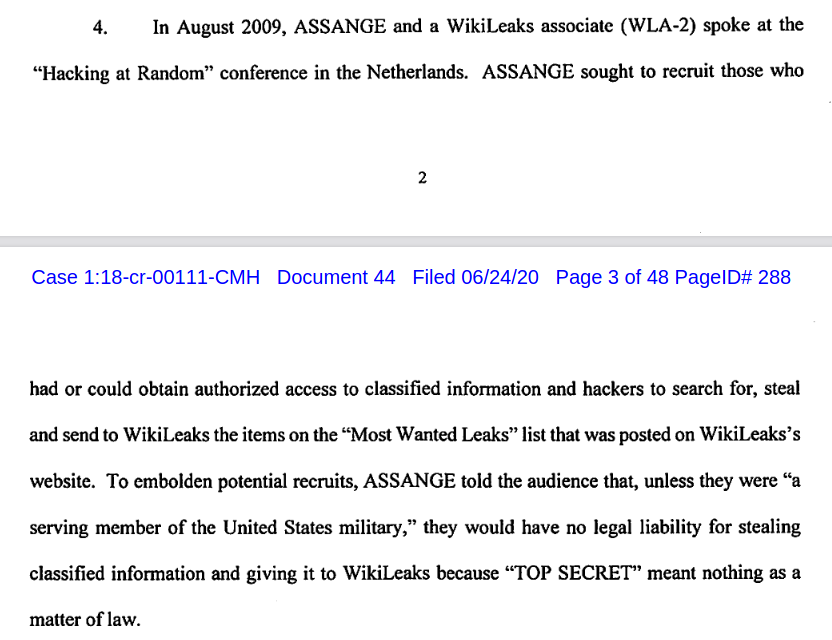
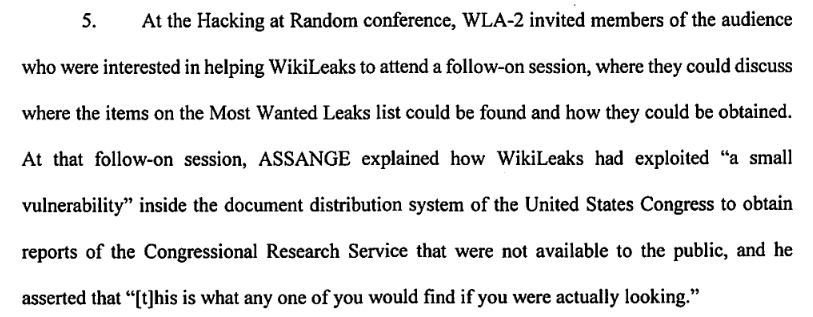
In the next paragraph, the prosecution describes Assange introducing himself at the 2009 Hack in the Box Security where he explains his background and why, as he puts it, he’s involved in WikiLeaks. The prosecutors quote him referring to his past as a hacker as, “I was a famous teenage hacker in Australia, and I’ve been reading generals’ emails since I was 17“, skipping the words “and a long-term activist” from the middle of the quote. The paragraph ends by referring to Assange bringing up the “Most Wanted Leaks” list in the final minute of his talk.
The next portion of the indictment deals mostly with Assange’s chats with Manning as they relate to solicitation and the original charge for Conspiracy to Commit Computer Intrusions, all of which have been widely discussed. For a brief explanation of the hacking charge, see Wired’s Breaking Down the Hacking Case Against Julian Assange.
[pdf id='156']
The section does also refer to the 2010 appearance Jacob Appelbaum, the only known American member of WikiLeaks, at Hacker’s On Planet Earth. It contains two brief quotes, each four words long, and makes a generalized reference to the speech. Because the reference is general, attempting to provide excerpts would be pointless, so the complete video is embedded below.
The next portion of the indictment refers to chat logs and allegations about Assange and WikiLeaks’ communications with and ties to Anonymous and other hacker groups. Most of this was first reported by myself (Sealed transcripts allege Assange and WikiLeaks solicited hacks against governments, politicians and corporations – and received files as a result) and Dell Cameron (WikiLeaks Helped Hackers Rifle Through Stolen Company Emails, Leaked FBI Docs Show) in November 2018. I recommend reading those directly, as they contain an in-depth exploration as well as source material.
The next two sections of the indictment involves Assange’s alleged efforts to recruit system administrators. While it doesn’t directly relate to any known charges, they may hint at some of the prosecution’s plans. Overtly focusing on WikiLeaks’ role in the Snowden affair and their later used to attempt to recruit sources. These sections make specific mention of CIA system administrators, a description that applies to WikiLeaks’ Vault 7 source, Joshua Schulte. When the indictment was issued, Schulte’s trial was pending, but has since been convicted.
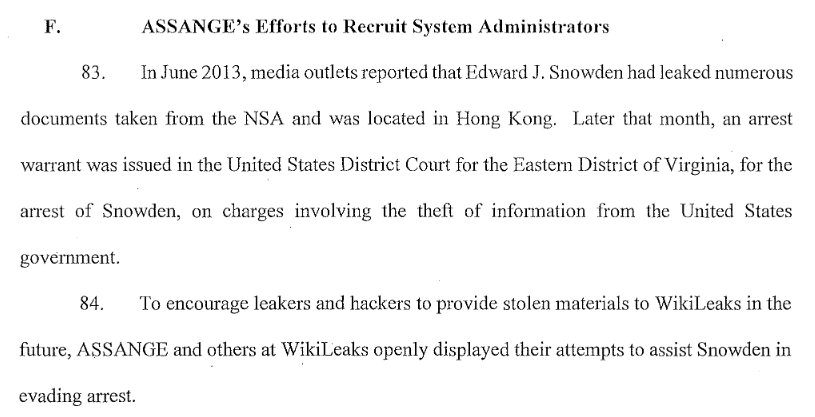
On the last day of 2013, Assange, Jacob Appelbaum and Sarah Harrison appeared at the Chaos Computer Club’s annual meeting and gave a panel presentation where they described their role in Snowden’s escape, and the potential power that system administrators in all fields have. Perhaps most notably and potentially relevant to the Schulte case, Assange told listeners to “go and join the CIA. Go in there, go into the ballpark and get the ball and bring it out.” (Schulte joined CIA in 2010 and became a system administrator in 2015.)
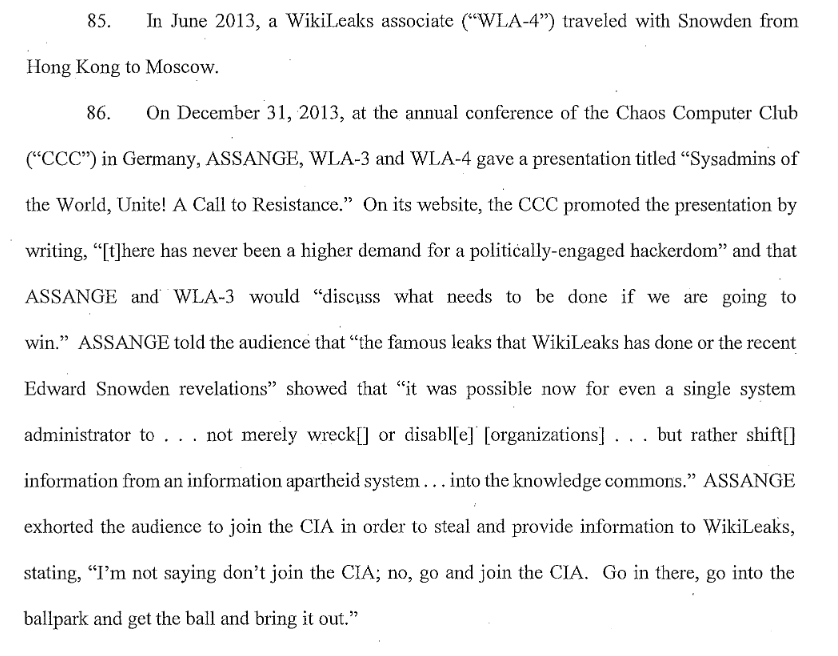
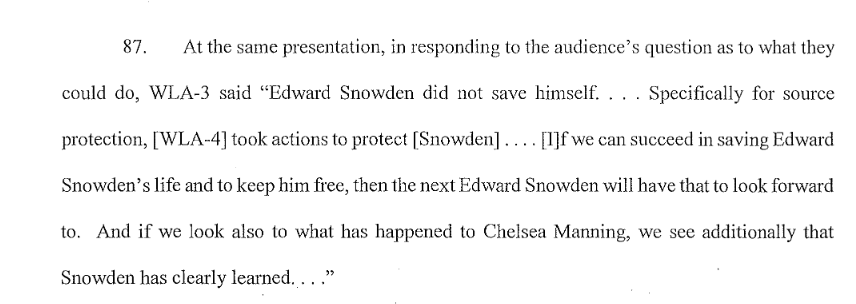
The next section of the indictment brings up Sarah Harrison’s appearance at re:publica, and quotes her saying that WikiLeaks’ mission is “to publish classified or in any other way censored information that is of political, historical importance.” The indictment presents this as her seeking “to recruit those who had or could obtain authorized access to classified information and hackers to search for and send the classified or otherwise stolen information to WikiLeaks.” In context, she’s answering a question about the scope of WikiLeaks’ tools and publications and how much of it involves previously published but difficult to search material.
The next section of the indictment includes a long quote of Assange describing WikiLeaks’ role in creating distraction operations to aid in Snowden’s escape. The video of the original interview, with a complete transcript, can be found at DemocracyNow where it was first published.
In the final section, Jacob Appelbaum and Sarah Harrison appear at a 2015 Rosa Luxemburg Foundation event. At the event, Appelbaum suggested “the long march through the institution,” comparing it to Snowden, and that people “find the right informational way to strike so that you don’t actually have to harm anyone.” Appelbaum and Harrison agreeing that WikILeaks would publish the information.

There are many damning things that Julian Assange others at WikiLeaks have said, often on the record and at times on video. The prosecution’s selection for the second superseding indictment has a lot of relevant information, but there will be openings and opportunities for Assange’s defense team when he stands trial. What is there may give an insight to the prosecutor’s intentions for the Assange case, and it could hint at a broader case against people including Appelbaum and Harrison – or if they can establish the right pattern of behavior, against WikiLeaks itself as an organization.
